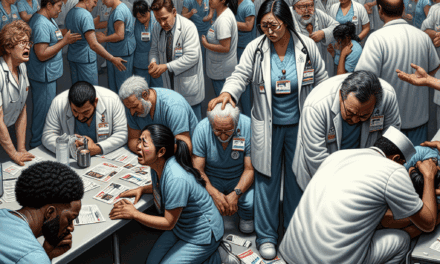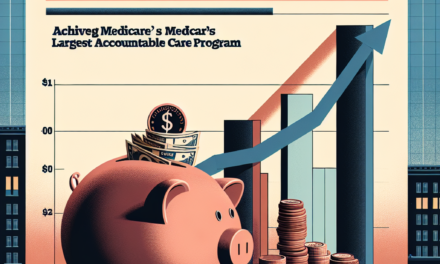UnitedHealth Appoints New Leader for Government Programs and Medicaid Division
In a significant move that underscores the importance of government programs and Medicaid in the healthcare landscape, UnitedHealth Group has appointed a new leader for its Government Programs and Medicaid Division. This appointment comes at a time when the healthcare industry is undergoing rapid changes, driven by policy shifts, technological advancements, and evolving patient needs. This article delves into the implications of this leadership change, the challenges and opportunities facing the Medicaid sector, and the broader context of government programs in the United States.
The Role of Government Programs in Healthcare
Government programs play a crucial role in the American healthcare system, providing essential services to millions of individuals and families. These programs, primarily Medicare and Medicaid, are designed to ensure that vulnerable populations have access to necessary medical care.
- Medicare: A federal program primarily for individuals aged 65 and older, as well as certain younger individuals with disabilities. It covers hospital care, medical services, and prescription drugs.
- Medicaid: A joint federal and state program that provides health coverage to low-income individuals and families. It covers a wide range of services, including hospital visits, long-term care, and preventive services.
- Children’s Health Insurance Program (CHIP): A program that provides health coverage to children in families with incomes too high to qualify for Medicaid but too low to afford private coverage.
These programs are vital for ensuring health equity, as they provide coverage to populations that might otherwise be uninsured. According to the Centers for Medicare & Medicaid Services (CMS), as of 2021, over 80 million individuals were enrolled in Medicaid and CHIP, highlighting the program’s significance in the healthcare ecosystem.
Leadership Change: Implications for UnitedHealth
The appointment of a new leader for UnitedHealth’s Government Programs and Medicaid Division signals a strategic shift within the organization. This change is not merely administrative; it reflects a broader vision for how UnitedHealth intends to navigate the complexities of government healthcare programs.
The new leader, whose background includes extensive experience in healthcare policy and management, is expected to bring fresh perspectives and innovative strategies to the division. This is particularly important as the Medicaid landscape is evolving rapidly due to several factors:
- Policy Changes: The Biden administration has introduced various reforms aimed at expanding Medicaid access and improving care quality.
- Technological Advancements: The integration of technology in healthcare delivery is transforming how services are provided and managed.
- Increased Competition: With more players entering the Medicaid space, UnitedHealth must differentiate itself through quality and efficiency.
As the new leader steps into this role, they will need to address these challenges head-on while also capitalizing on opportunities for growth and innovation. This includes enhancing care coordination, improving patient outcomes, and ensuring compliance with regulatory requirements.
Challenges Facing the Medicaid Sector
The Medicaid sector is fraught with challenges that require strategic leadership and innovative solutions. Some of the most pressing issues include:
- Funding Constraints: Medicaid is funded through a combination of federal and state resources, and budget constraints can limit the services offered.
- Access to Care: Many Medicaid beneficiaries face barriers to accessing care, including provider shortages and transportation issues.
- Quality of Care: Ensuring high-quality care for Medicaid recipients is a persistent challenge, with disparities in health outcomes often observed among different demographic groups.
Addressing these challenges requires a multifaceted approach. For instance, UnitedHealth can leverage data analytics to identify gaps in care and develop targeted interventions. Additionally, partnerships with community organizations can help improve access to services and address social determinants of health.
Moreover, the new leader will need to advocate for sustainable funding models that ensure the long-term viability of Medicaid programs. This may involve engaging with policymakers to promote reforms that enhance funding and support for Medicaid initiatives.
Opportunities for Innovation in Medicaid
Despite the challenges, there are numerous opportunities for innovation within the Medicaid sector. The new leader at UnitedHealth has the potential to drive transformative changes that can enhance service delivery and improve patient outcomes.
- Telehealth Expansion: The COVID-19 pandemic accelerated the adoption of telehealth services, which can improve access to care for Medicaid beneficiaries, particularly in rural areas.
- Value-Based Care Models: Shifting from fee-for-service to value-based care can incentivize providers to focus on quality and outcomes rather than volume.
- Data-Driven Decision Making: Utilizing data analytics can help identify trends, improve care coordination, and enhance patient engagement.
For example, UnitedHealth can implement telehealth programs that cater specifically to the needs of Medicaid recipients, ensuring that they have access to necessary services without the barriers of transportation or long wait times. Additionally, by adopting value-based care models, UnitedHealth can align incentives with patient outcomes, ultimately leading to better health results for Medicaid beneficiaries.
The Future of Medicaid Under New Leadership
The future of Medicaid under the new leadership at UnitedHealth is poised for significant transformation. As the healthcare landscape continues to evolve, the new leader will play a critical role in shaping the direction of the Government Programs and Medicaid Division.
Key areas of focus will likely include:
- Enhancing Care Coordination: Improving the integration of services across the continuum of care to ensure that Medicaid beneficiaries receive comprehensive support.
- Advocating for Policy Reforms: Engaging with stakeholders to promote policies that enhance funding and support for Medicaid programs.
- Fostering Innovation: Encouraging the adoption of new technologies and care models that improve patient outcomes and operational efficiency.
As the new leader implements these strategies, it will be essential to monitor the impact of these changes on patient care and overall program effectiveness. By focusing on innovation and collaboration, UnitedHealth can position itself as a leader in the Medicaid space, ultimately benefiting millions of individuals who rely on these critical services.
Conclusion
The appointment of a new leader for UnitedHealth’s Government Programs and Medicaid Division marks a pivotal moment in the company’s strategy to navigate the complexities of government healthcare programs. As the Medicaid landscape continues to evolve, this leadership change presents both challenges and opportunities for innovation.
By addressing the pressing issues facing the Medicaid sector, such as funding constraints, access to care, and quality of services, UnitedHealth can enhance its offerings and improve outcomes for beneficiaries. The new leader’s focus on telehealth expansion, value-based care models, and data-driven decision-making will be crucial in driving transformative changes within the division.
As we look to the future, the success of UnitedHealth’s Government Programs and Medicaid Division will depend on its ability to adapt to the changing healthcare environment while remaining committed to providing high-quality care for vulnerable populations. Through strategic leadership and innovative solutions, UnitedHealth has the potential to make a lasting impact on the Medicaid landscape, ultimately improving the health and well-being of millions of Americans.





